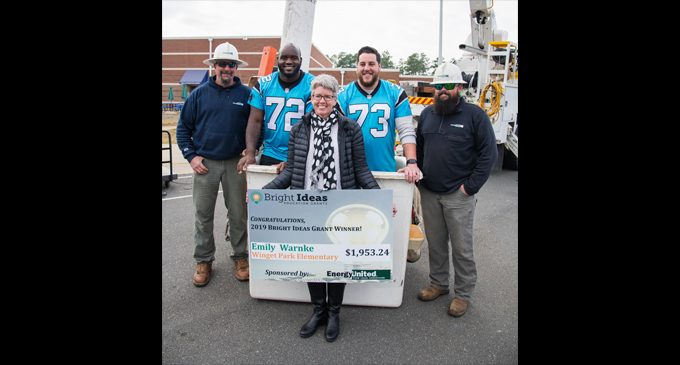EnergyUnited awards more than $42,000 to teachers for their ‘bright ideas’
Emily Warnke, grant winner, stands with EnergyUnited associates and players from the Carolina Panthers.

STATESVILLE – EnergyUnited has awarded more than $42,000 in Bright Ideas education grants to 45 teachers to fund innovative classroom projects. Students at schools in Alexander, Catawba, Davidson, Davie, Forsyth, Guilford, Iredell, Mecklenburg and Rowan Counties, will participate in Bright Ideas projects funded by EnergyUnited this year.
“Educators who win Bright Ideas grants are going above and beyond for their students,” said Maureen Moore, communications manager of EnergyUnited. “We’re excited to support their innovative and creative learning initiatives through the Bright Ideas program each year.”
This year, Bright Ideas education grants from EnergyUnited will be used to fund units on: robotics, renewable energy, technology, multicultural music and much more. EnergyUnited recognized winners throughout the month of November at two regional luncheons in Statesville and Lexington and arranged special surprise visits for winning teachers in its Lake Norman Region.
Since the Bright Ideas grant program began in 1994, EnergyUnited has contributed more than $800,000 to local teachers.
“We were incredibly honored to recognize each of our winners at our two regional luncheons and during our Lake Norman surprise visits,” said Moore.
EnergyUnited is one of 26 member-owned electric cooperatives in the state offering Bright Ideas grants to local educators. During the month of November, North Carolina’s electric cooperatives awarded teachers statewide close to $600,000 in Bright Ideas education grants.
Bright Ideas grant applications are collected each year from April through mid-September and winning proposals are selected in a competitive evaluation process by a panel of judges. The application process will reopen for interested teachers in April 2020. To find out more information about the Bright Ideas grant program, visit www.energyunited.com/bright-ideas-program.
The Bright Ideas program is just one example of the electric cooperatives’ commitment to community. In addition to supporting local communities, North Carolina’s 26 electric cooperatives power the lives of more than 2.5 million people in 93 of the state’s 100 counties.










